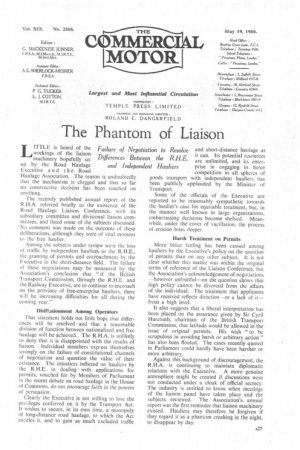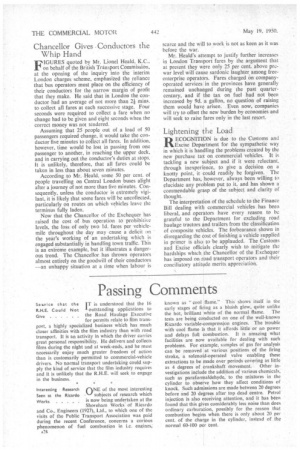The Phantom of Liaison
Page 29

Page 30

If you've noticed an error in this article please click here to report it so we can fix it.
T,ITTLE is heard, of the workings of the liaison machinery hopefully set up by the Road Haulage Executive and -the Road Haulage Association. The reason is undoubtedly that the mechanism is dogged and that so far no constructive decision• has been reached on anything.
The recently published annual report of the R.H.A. referred briefly, to the 'existence of the Road' Haulage Liaison Conference, with its subsidiary committee and divisional liaison committees, and listed some of the subjects discussed. No comment was made on the outcome of these deliberations, although theywere of vital moment to the free haulier.
Among the subjects under review were the loss of traffic by independent hauliers to the R.H.E., the granting of permits and encroachment by the Executive in the shott-distance field. The failure of these negotiations may be measured by the Association's conclusion that "if the British Transport Commission, through the R.H.E. and the Railway Executive, are to continue to encroach On the province of free-enterprise hauliers, there will be increasing difficulties for all during, the coming year."
Disilbsionment Among Operators That statement holds out little hope that differences Will be resolved • and that a reasonable division of function between nationalized and free haulage will be achieved. The R.H.A. is unlikely to deny that it is disappointed with the results of liaison. individual members express themselves strongly on the failure of constieutional channels of negotiation and question the value of their existence. The injustices inflicted on hauliers by the R.H.E. in dealing with applications for permits, vouched for by Members of Parliament in the recent debate on road haulage in the House of Commons. do not encourage faith in the powers of persuasion.
Clearly the Executive is not willing to lose the privileges conferred on it by the Transport Act.. It wishes to secure, in its own time, a monopoly of long-distance road haulage, to which the Act entitles it, and to gain as much excluded traffic Failure of Negotiation to Resolve and short-distance haulage as 7, r. it can. Its potential resources Differences Between the R.1-1.L. are unlimited, and its enter and Independent Hauliers prise in engaging in fierce competition in all spheres of goods transport with independent hauliers has been publicly applauded by the Minister of Transport.
Some of the officials of the Executive are reported to be reasonably sympathetic towards the haulier's case for equitable treatment, but, in the manner, well known in large organizations, embarrassing decisions become shelved. Meanwhile, under the cover of vacillation, the process of erosion bites deeper.
Harsh Treatment on Permits More bitter feeling has been caused among hauliers by the Executive's policy on the question of permits than on any other subject. It is not clear whether this matter was within the original terms of reference of the Liaison Conference, but the Association's acknowledgement of negotiations —however unfruitful—on the question shows that high policy cannot be divorced from the affairs of the individual. The treatment that applicants have received reflects direction—or a lack of it— from a high level.
It also suggests that a liberal interpretation has been placed on the assurance given by Sir Cyril Hurcomb, chairman of the British Transport Commission, that latitude would be allowed in the issue of original permits. His Wish " to be scrupulous in avoiding harsh or arbitrary action" has also been flouted. The cases recently quoted in Parliament could hardly have been harsher or more arbitrary.
Against this background of discouragement, the R.H.A. is continuing to maintain diplomatic relations with the Executive. A more genuine atmosphere might be created if discussions were not conducted under a cloak of official secrecy. The industry is entitled to know when meetings of the liaison panel have taken place and the subjects reviewed. The Association's annual report was-the first reminder that liaison machinery existed. Hauliers may therefore be forgiven if they regard it as a phantom creaking in the night, to disappear by day.
Chancellor Gives .Conductors the Whip Hand
FIGURES quoted by Mr. Lionel Heald, K.C., on behalf of the British Transport Commission, at the opening of the inquiry into the interim London charges scheme, emphasized the reliance that bus operators must place on the efficiency of their conductors for the narrow margin of profit that they make. He said that in London the conductor had an average of not more than 2i mins. to collect all fares at each successive stage. Four seconds were required to collect a fare when no change had to be given and eight seconds when the correct money was not tendered. Assuming that 25 people out of a load of 50 passengers required change, it would take the conductor five minutes to collect all fares. In addition, however, time would be lost in passing from one passenger to another, in reaching the upper deck, and in carrying out the conductor's duties at stops. It is unlikely, therefore, that all fares could be taken in less than about seven minutes. According to Mr. -Heald, some 50 per cent. of people travelling on Central London buses alight after a journey of not more than five minutes. Consequently, unless the conductor is extremely vigilant, it is likely that some fares will be -uncollected. particularly on routes on which vehicles leave the terminus fully laden. Now that the Chancellor of the Exchequer has raised the cost of bus operation to prohibitive levels, the loss of only two Id. fares per vehiclemile throughout the day may -cause a deficit on the year's working of an undertaking which is engaged substantially in handling town traffic. This is an extreme example, but it illustrates a dangerous trend. The Chancellor. has thrown operators almost entirely on the goodwill of their conductors —an unhappy situation at a time when labour is
scarce and the will to work is not as keen as it was before the war.
Mr. Heald's attempt to justify further increases in London Transport fares by the argument that at present they were only 25 per cent. above prewar level will cause sardonic laughter among freeenterprise operators. Fares charged on companyoperated services in the provinces have generally remained unchanged during the past quartercentury, and if the tax on fuel had not been increased by 9d. a gallon, no question of raising them would have arisen. Even now, companies will try to offset the new burden by economies and will seek to raise fares only in the last resort.
Lightening the Load
RECOGNITION is due to the Customs and Excise Department for the sympathetic way in which it is handling the problems created by the new purchase tax on commercial vehicles. It is tackling a new subject and if it were reluctant. through inexperience, to give a decision on a knotty point, it could readily be forgiven. The Department has, however, always been willing to elucidate any problem put to it. and has shown a commendable grasp of the subject and clarity of thought. The interpretation of the schedule to the Finance Bill dealing with commercial vehicles has been liberal, and operators have every reason to be grateful to the Department for excluding road haulage tractors and trailers from the classification of composite vehicles. The forbearance shown in disregarding the cost of finishing a vehicle supplied in primer is also to be applauded. The Customs and Excise officials clearly wish to mitigate the hardships which the Chancellor of the Exchequer has imposed on road transport operators and their conciliatory attitude merits appreciation.




























































































